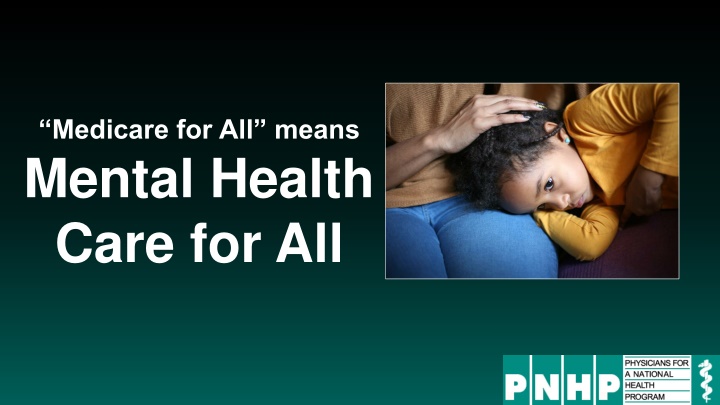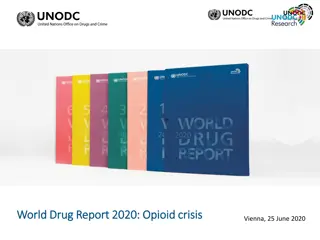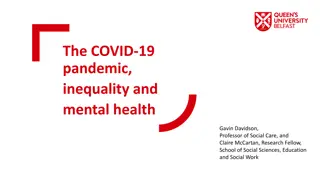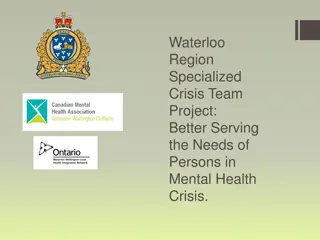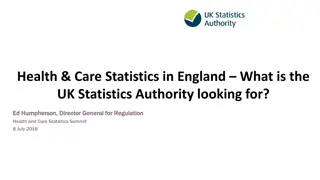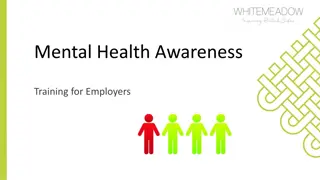America's Mental Health Crisis: Facts & Statistics
America is facing a severe mental health crisis, with high rates of mental illness, suicides, and overdoses. The pandemic has exacerbated the situation, leading to increased mental health issues. Data from recent years highlight the urgency for initiatives like Medicare for All to ensure mental health care for all individuals.
Download Presentation

Please find below an Image/Link to download the presentation.
The content on the website is provided AS IS for your information and personal use only. It may not be sold, licensed, or shared on other websites without obtaining consent from the author.If you encounter any issues during the download, it is possible that the publisher has removed the file from their server.
You are allowed to download the files provided on this website for personal or commercial use, subject to the condition that they are used lawfully. All files are the property of their respective owners.
The content on the website is provided AS IS for your information and personal use only. It may not be sold, licensed, or shared on other websites without obtaining consent from the author.
E N D
Presentation Transcript
Medicare for All means Mental Health Care for All
America Has Long Faced A Mental Health Crisis Mental illness is rampant Adults with At Least One Mental Illness Adults with a Serious Mental Illness 21% of adults experienced mental illness in 2019 20.6% 5.2% 17.7% 3.7% 2008 2019 2008 2019 https://www.samhsa.gov/data/sites/default/files/reports/rpt29393/2019NSDUHFFRPDFWHTML/2019NSDUHFFR090120.htm
America Has Long Faced A Mental Health Crisis Mental illness is rampant 18 25-year-olds with a mental Illness Youth with a Serious Mental Illness 21% of adults experienced mental illness in 2019 9.7% of youth had severe major depression in 2018 29.4% 8.6% 18.5% 3.8% 2008 2019 2008 2019 https://www.samhsa.gov/data/sites/default/files/reports/rpt29393/2019NSDUHFFRPDFWHTML/2019NSDUHFFR090120.htm https://www.mhanational.org/issues/state-mental-health-america
America Has Long Faced A Mental Health Crisis Mental illness is rampant Suicides Overdoses Our suicide rate rose by 35% since 1999 Now the second leading cause of death between ages 10 and 34 21% of adults experienced mental illness in 2019 9.7% of youth had severe major depression in 2018 70,000 Americans died from drug overdoses in 2019, a 57% increase from 2013 https://www.samhsa.gov/data/sites/default/files/reports/rpt29393/2019NSDUHFFRPDFWHTML/2019NSDUHFFR090120.htm https://www.mhanational.org/issues/state-mental-health-america https://www.nimh.nih.gov/health/statistics/suicide.shtml https://www.samhsa.gov/data/sites/default/files/reports/rpt29393/2019NSDUHFFRPDFWHTML/2019NSDUHFFR090120.htm
America Has Long Faced A Mental Health Crisis Mental illness is rampant Suicides Overdoses When we get the data for 2020 and 2021, we will probably find out that the pandemic has been making these numbers much worse. https://www.samhsa.gov/data/sites/default/files/reports/rpt29393/2019NSDUHFFRPDFWHTML/2019NSDUHFFR090120.htm
The Pandemic Devastated Our Mental Health 41% of adults experienced mental illness (nearly doubled 2019) Rates of anxiety were three times higher As of July 2020 Rates of depression were nearly four times higher Suicidal thoughts had more than doubled >81,000 died from drug overdoses, a 21% jump from 2019 https://www.cdc.gov/mmwr/volumes/69/wr/mm6932a1.htm https://www.cdc.gov/mmwr/volumes/69/wr/mm6932a1.htm https://www.cdc.gov/mmwr/volumes/69/wr/mm6932a1.htm https://www.kff.org/coronavirus-covid-19/issue-brief/the-implications-of-covid-19-for-mental-health-and-substance-use/ https://www.cdc.gov/nchs/nvss/vsrr/drug-overdose-data.htm
Most Americans, including those with mental illnesses, Had Health Insurance in 2019 11% 11% 12% 2019 data With or without insurance, could they get mental health care? Uninsured 89% 89% 88% Insured Non-elderly adults (total) Adults with a mental illness Adults with a serious mental illness https://www.samhsa.gov/data/report/2019-nsduh-detailed-tables https://www.kff.org/uninsured/issue-brief/key-facts-about-the-uninsured-population/
Even before the pandemic, many Americans were Unable to Get Mental Health Care 57% of Americans with mental illness cannot access treatment cannot access treatment 73% of youth with depression 90% with substance abuse disorders cannot access treatment Too many of us cannot access mental health care... because insurance companies stand in our way. https://www.mhanational.org/issues/2020/mental-health-america-access-care-data https://www.mhanational.org/issues/state-mental-health-america https://www.samhsa.gov/data/sites/default/files/reports/rpt29393/2019NSDUHFFRPDFWHTML/2019NSDUHFFR090120.htm#tx2
Commercial Insurers Discriminate Against Mental Health Care In Several Ways Deny access Limit choice Restrict or deny common treatments Many offer few (or no!) local providers Pay less Pay mental health providers far less
Commercial Insurers Discriminate Against Mental Health Care In Several Ways Plans pay mental health providers 24% less than primary care providers for similar services, causing mental health providers to opt out of insurance networks. In 11 states, PPOs paid mental health providers 50% less than PCPs Pay less https://www.milliman.com/- /media/milliman/importedfiles/ektron/addictionandmentalhealthvsphysicalhealthwideningdisparitiesinnetworkuseandproviderreimbursement.ashx https://www.milliman.com/- /media/milliman/importedfiles/ektron/addictionandmentalhealthvsphysicalhealthwideningdisparitiesinnetworkuseandproviderreimbursement.ashx
Commercial Insurers Discriminate Against Mental Health Care In Several Ways Plans pay mental health providers 24% less than primary care providers for similar services, causing mental health providers to opt out of insurance networks. Only 55% of psychiatrists accept commercial insurance, compared to 90% of other physicians. As a result, much of the country has no real access to psychiatrists or psychologists. Pay less https://www.milliman.com/- /media/milliman/importedfiles/ektron/addictionandmentalhealthvsphysicalhealthwideningdisparitiesinnetworkuseandproviderreimbursement.ashx https://jamanetwork.com/journals/jamapsychiatry/fullarticle/1785174 https://jamanetwork.com/journals/jamapsychiatry/fullarticle/1785174
Commercial Insurers Discriminate Against Mental Health Care In Several Ways 61% of counties outside core metro areas had no psychologists 80% of counties outside core metro areas had no psychiatrists Pay less https://www.ajpmonline.org/article/S0749-3797(18)30005-9/fulltext
Commercial Insurers Discriminate Against Mental Health Care In Several Ways A visit to a mental health provider is six to ten times more likely to be out-of-network. Patients wait weeks or months for appointments, travel long distances, or seek costly care from out-of-network providers. Limit choice Pay less Many patients simply give up.
Commercial Insurers Discriminate Against Mental Health Care In Several Ways Office Visits Out-of-Network 17.2% Limit choice 4.3% 3.2% Pay less Primary Care Specialty Care Behavioral Care 2017 PPO data https://www.milliman.com/- /media/milliman/importedfiles/ektron/addictionandmentalhealthvsphysicalhealthwideningdisparitiesinnetworkuseandproviderreimb ursement.ashx
Commercial Insurers Discriminate Against Mental Health Care In Several Ways Deny access Limit choice Insurers limit or deny common treatments such as prescription medications, behavioral therapy and hospitalization. In 2019, United Behavioral Health was found guilty of denying 67,000 claims for mental health care based on financial not medical reasons. Pay less https://casetext.com/case/wit-v-united-behavioral-health-8
Commercial Insurers Discriminate Against Mental Health Care In Several Ways Deny access Limit choice Expanding coverage to insurance without making it better isn t nearly enough. Insurance should not be designed and incented to get in the way of healthcare. Incremental reforms are unlikely to fix this. Pay less https://casetext.com/case/wit-v-united-behavioral-health-8
Incremental reforms in mental health care Have Had Limited Value Mental Health Parity Substance Abuse Established in laws by Presidents Clinton, GW Bush, and Obama The percentage of people unable to get care continues to get worse. ACA includes treatment as an essential health benefit 89.7% of Americans aged 12+ were unable to get treated in 2019 https://www.congress.gov/bill/104th-congress/house-bill/3666 https://www.govinfo.gov/content/pkg/PLAW-110publ343/pdf/PLAW-110publ343.pdf https://www.samhsa.gov/data/sites/default/files/reports/rpt29393/2019NSDUHFFRPDFWHTML/2019NSDUHFFR090120.htm https://www.samhsa.gov/data/sites/default/files/reports/rpt29393/2019NSDUHFFRPDFWHTML/2019NSDUHFFR090120.htm#tx2
Wont improving access to mental health services be Prohibitively Expensive? Not when you consider the alternative. Blocking access to mental and behavioral health care has been shown to worsen overall health outcomes (including mortality). Providing full coverage for mental health care will help avoid costlier care down the road. https://onlinelibrary.wiley.com/doi/pdf/10.1093/clipsy.6.2.204 https://www.thelancet.com/commissions/physical-health-in-mental-illness https://www.ncbi.nlm.nih.gov/pmc/articles/PMC2966471/
Why Single Payer Medicare for All? Barriers to Care Choice of providers Commercial Insurance Medicare for All Coverage and free choice of every hospital and provider. Networks are so limited that many patients give up before they get care. Many pay thousands of dollars before any mental health care is covered. Full coverage with no copays or deductibles. Treatment costs Prescription drugs covered with no copays or deductibles. Prescription drug costs Formularies often require costly copays or exclude needed medications. Job-based insurance means patients frequently lose access to trusted providers. Coverage stays with you for Continuation of care life.
Medicare for All means Mental Health Care for All Medicare for All covers everybody for all medically necessary care, including prescriptions and services for behavioral and mental health, and substance use disorder. Lifelong, no interruptions, no copays, no deductibles. Free choice of hospitals and providers, including psychiatrists, psychologists, and licensed counselors. It s time to invest in America s mental health: It's time for Medicare for All
Physicians for National Health Program Non-profit, non-partisan, member-supported 501(c)3 Membership open to everyone www.PNHP.org @PNHP Facebook.com/DoctorsForSinglePayer
